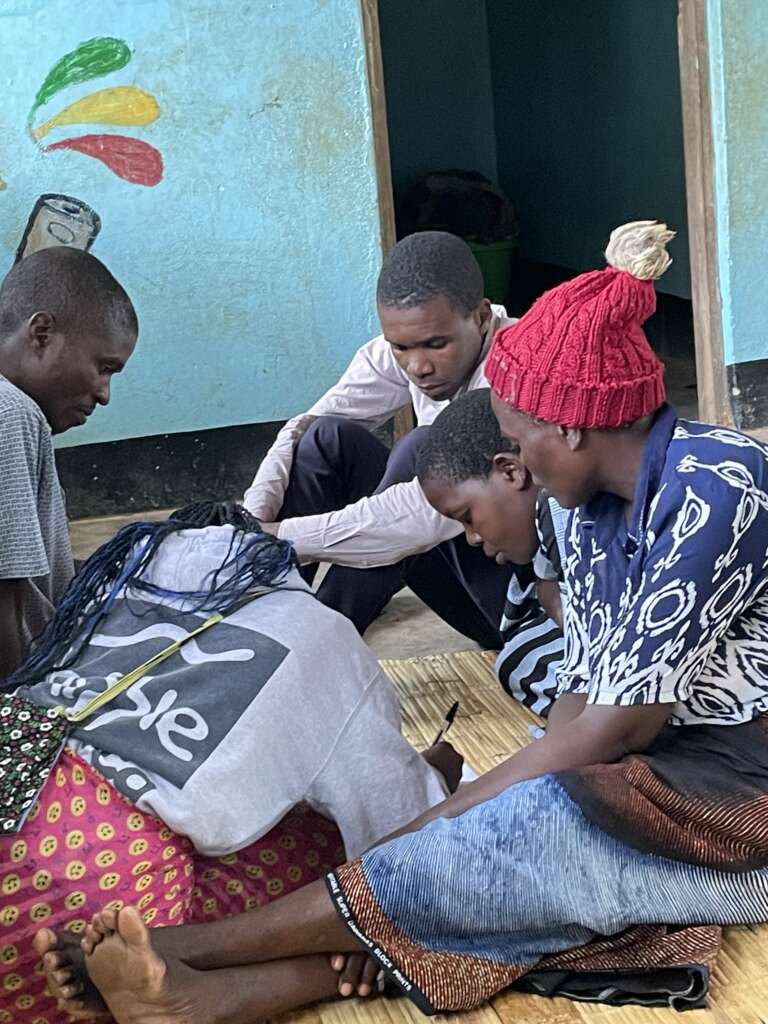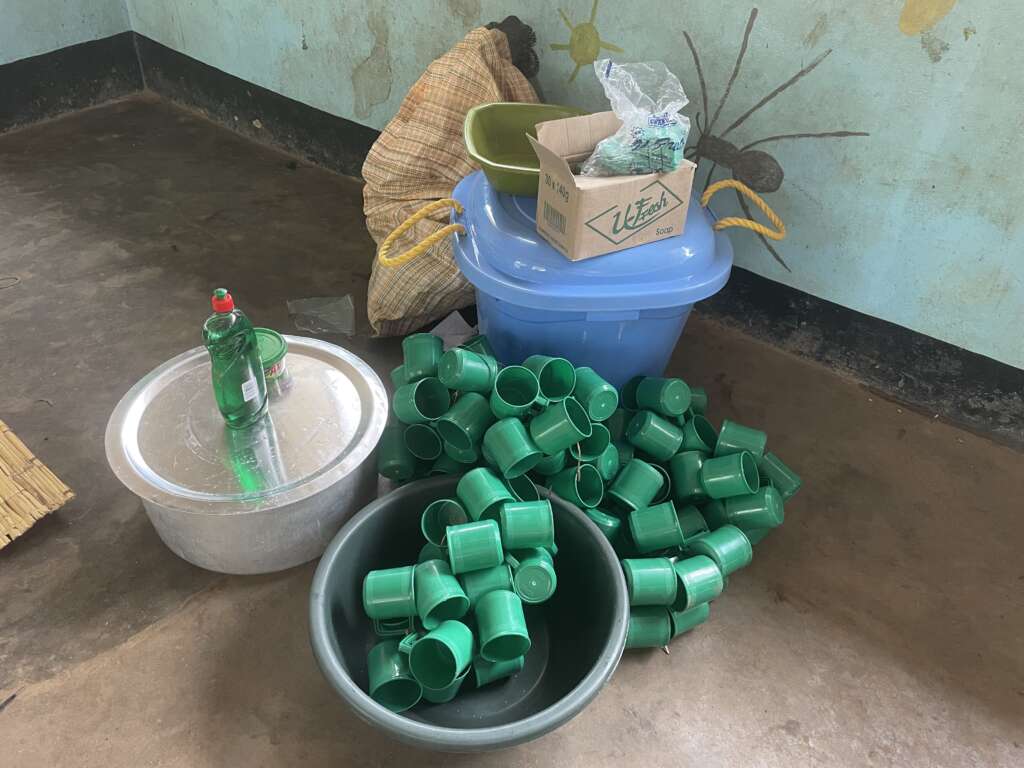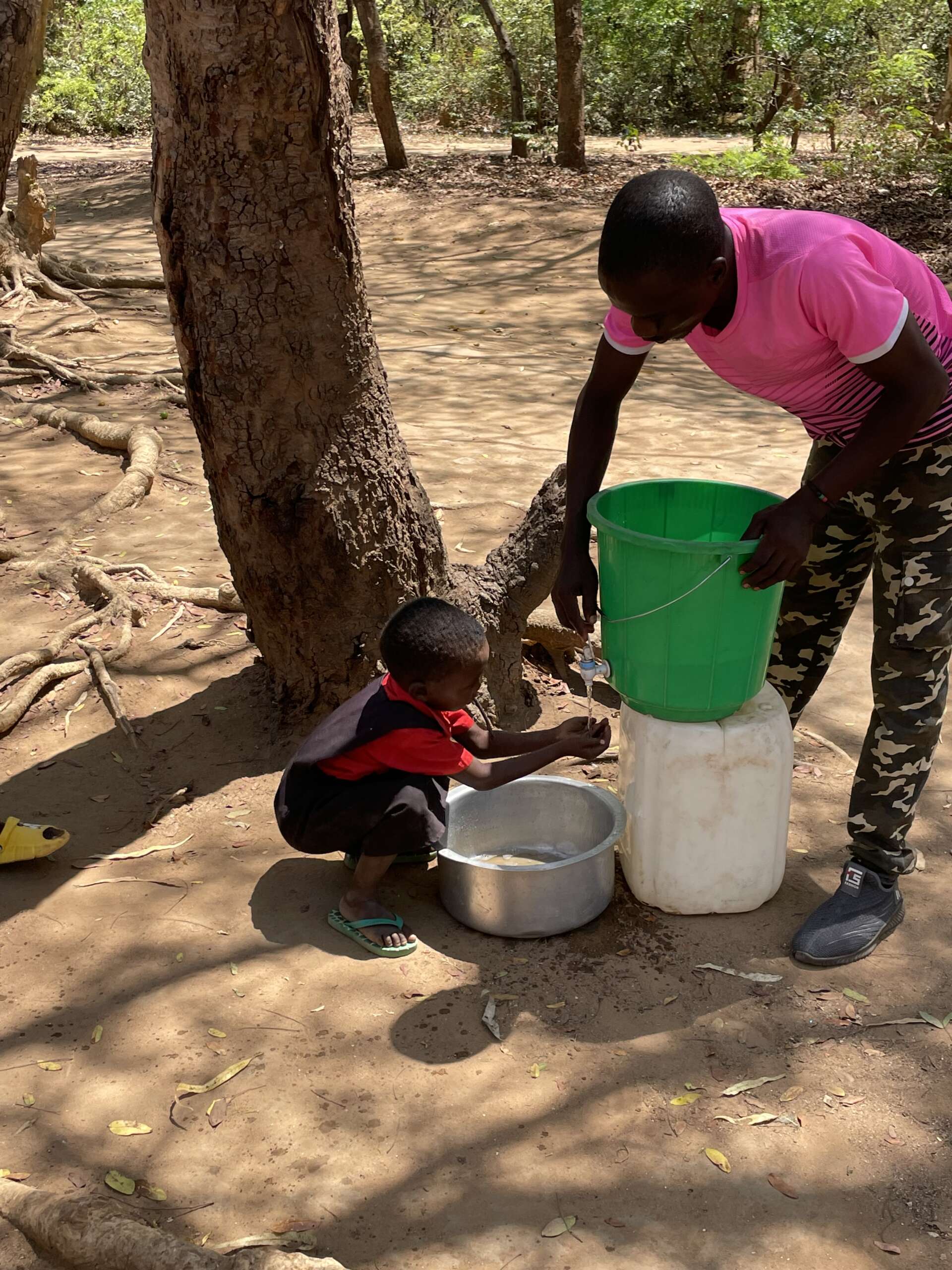Hygiene and handwashing are integral to professional healthcare practice in the UK. It is astonishing to experience a society where this just isn’t understood to be a priority. In the hospital here there is usually running (cold) water, but soap is not often available. It is simply not seen as a priority purchase. The irony of the posters on the walls about the importance of hygiene and handwashing hits me every day. I question how many extra antibiotics are used to treat infections spread because basic handwashing isn’t used. I have been buying and providing soap to the maternity unit each week because I simply can’t reconcile myself to there being none. Whilst this isn’t sustainable in the long term, it has helped to start conversations about hygiene.
My host charity, Ripple Africa, runs eight pre-schools https://rippleafrica.org/project/pre-school-education-in-malawi-africa/. This week I was invited to take part in a training session for the staff from these facilities, focusing on hygiene and handwashing. The aim is to develop understanding of the routes by which infection can spread and small changes that could reduce the risks. With conditions such as cholera being widespread and a major threat to lives here, we hope that staff will model safe behaviours and instil good hygiene habits in the children in their care. Over 37,000 cases of malaria were reported last year. In a country with such poor infrastructure the reported cases will inevitably be the tip of an iceberg.
Cholera is spread by the fecal oral route. This is also how other conditions such as childhood diarrhoea, polio and hepatitis A are spread. These conditions affect people worldwide. In some cases people can develop some immunity to organisms that they are in frequent contact with. For example pathogens (organisms that cause disease) which cause travellers’ diarrhoea may not cause illness in local people. However, other conditions such as cholera remain a major threat to everyone https://www.who.int/emergencies/disease-outbreak-news/item/2022-DON435
For these infections organisms are in the gut of the infected person. We can prevent spread by safe toilet provision and handwashing. In the UK I talk with clients about the importance of frequent handwashing. Often I suspect that people think I am telling them things which are totally obvious, and that they wonder why I feel the need to say anything. Most of us have grown up with indoor toilets and a culture of “wash your hands when you have used the toilet”. Soap and clean running water are an assumed norm in the UK. However, many people do not follow such a simple hygiene practice very well – even when we have the facilities easily available.
Following birth, handwashing is super important for the health of mum and baby. In addition to the oral fecal route of infection, it is important to remember that there will always be a large raw area within the uterus where the placenta was attached. If you have any germs on your hands and then touch yourself while using the toilet or changing a pad, those germs can get into the genital tract. Blood and the warmth inside the body provide an ideal breeding environment for many pathogens. For that reason I advise during the first few weeks after birth handwashing when you enter the bathroom and again when you leave. Hygiene and handwashing when changing your baby’s nappy and before expressing breast milk or making food for you or your baby are clearly very important. Hand gel is a poor substitute for handwashing with soap and water, but is better than nothing. I am glad to have time with my UK clients to be able to discuss and share such important information https://yourmidwife.org.uk/
Discussion of hygiene and handwashing in the preschools in Malawi requires a much more basic approach. Most people have had limited education and have no understanding of science. The preschools are held in very basic shelters where there is no running water and only an outdoor pit toilet. There are often 80-100 children with two or three members of staff, so supervision is challenging. The staff cook sweet potatoes as a snack for the children each day and provide water for them to drink.
I explained (in very simple terms) the basic ways that infections can be spread, after which we discussed what control measures might be possible. Many staff had no prior understanding of fecal oral transmission, or of the potential infection risks posed by bat droppings or cockroaches on cups and toys.
Following previous training, the staff have been encouraging children to rinse their hands before snack time, but this has just been (literally) putting hands under running water for 5 seconds. This is water which the staff have collected from the local pump and carried in buckets at the start of the morning. What a way to start your working day, walking an often considerable distance, carrying heavy buckets of water! The children play outside, where human and animal urine and faeces can easily be a source of infection. Staff hand a piece of potato to each child. The cups are plastic beakers, often shared and dipped into a bucket of water to refill for each child. The cups were then stored, with the few toys they have, in areas accessed by bats, mice and cockroaches.
We used a special cream and UV light torch to demonstrate the difference between brief hand rinsing and washing effectively with soap and water. This is a version of a training method I have previously used in the UK and makes a the point in a way that people tend to understand and remember. We used the cream as a way to show how easily germs can be spread through touch, both directly to other people and onto cups and toys. With cream on our hands, we then shook hands with everyone and touched a few things. After showing people how it had spread, we asked them to rinse their hands as the children do. Using the light we could show them how little the brief rinsing had removed. See how this works: https://glitterbug.com.au/ I plan to run similar sessions in the hospital in the coming weeks.
I’ve led a lot of training sessions over many years of professional practice. I think this session was probably the one in which I saw the most active engagement of all participants. No-one avoided getting involved, no-one was reluctant to participate in small group discussions. There was laughter, there was much serious discussion, there were many looks of astonishment and new understanding. There is willingness to change and a desire to improve lives.

Thanks to a donor, Ripple Africa are able to set each preschool up with some basic equipment (including soap). We introduced them to a way to make handwashing fun and effective. They were both amazed and delighted to see the effect of soap, and readily agreed that this is something that they can easily introduce. Fortunately the process doesn’t require a significantly greater amount of water. They also have new cups, lidded containers for storing equipment and washing up equipment.

It is incredible to have the opportunity to spend so much time getting to really see how a community functions. It is a privilege to be able to be involved in projects which are simple enough to be realistic and sustainable whilst creating real and positive change. It is humbling to realise that the actual cost to change people’s lives can be very small in our terms. 8 bars of basic soap can be bought here for about £1. That’s a bar of soap for each preschool this week, each of which which will impact 80-100 children. I will be bringing few actual souvenirs home from this trip. I will bring many memories, but am choosing to use any spare money I have with me to support basic, life changing initiatives. I make no apology for sharing this link where you can support the work too https://rippleafrica.org/christmas-gifts/


1 Comment
Love your blogs Angie. You are making such an incredible difference and no doubt learning huge amounts too. We have such huge reliance on technology wletc when such simple measures are actually of core importance.